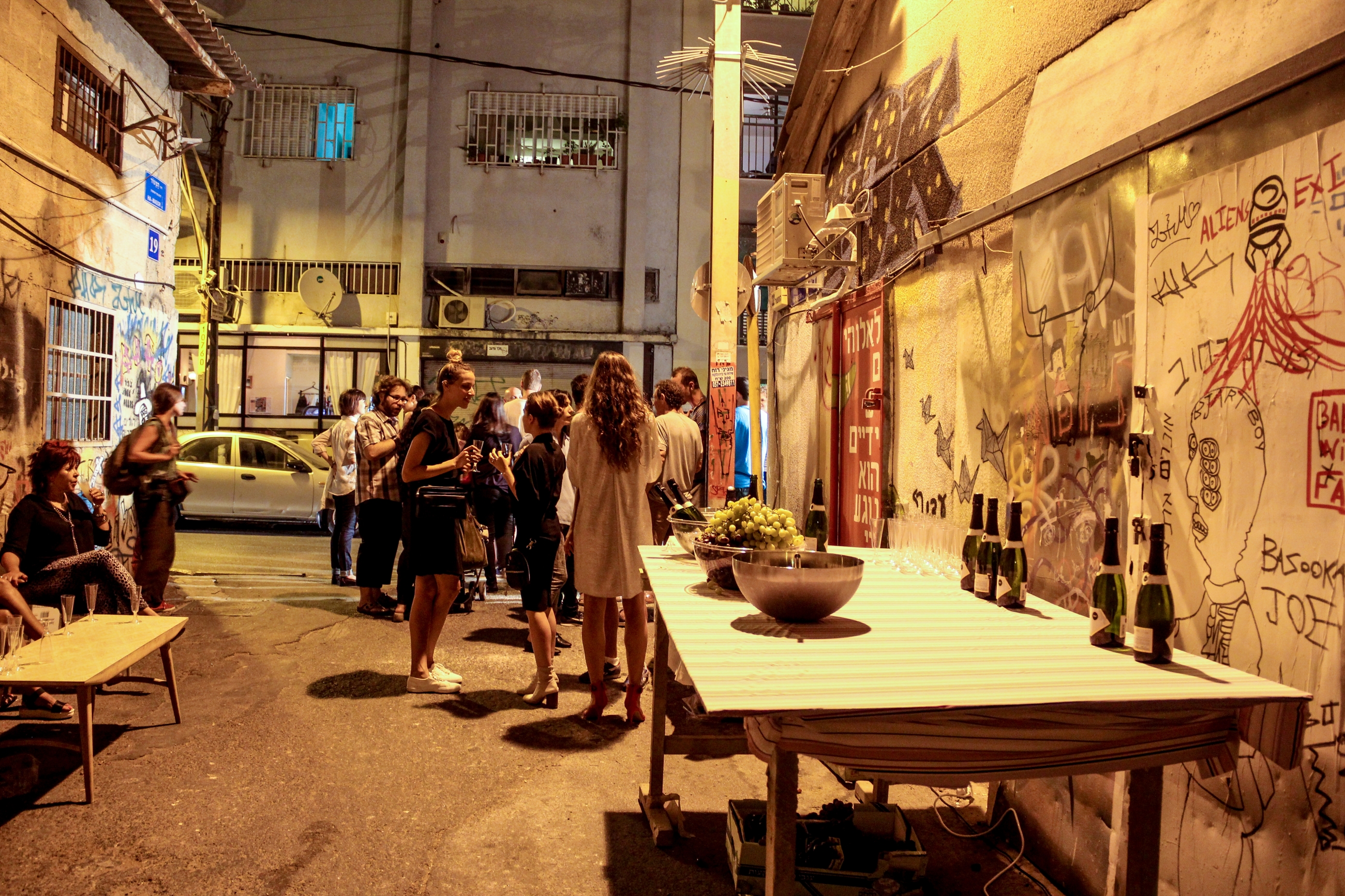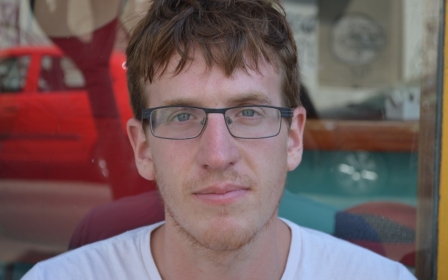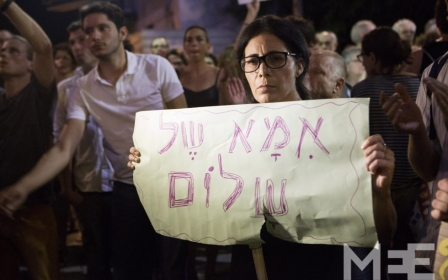For young Israelis, the other side ‘simply does not exist’

TEL AVIV – Packed with small vintage bars and graffiti, Florentine is the alternative neighbourhood of Tel Aviv where young Israelis like to hang out.
Despite a huge clash between a highly religious Jerusalem and a night-life oriented Tel Aviv – as well as an extremely fragile and sectarian division among the youth – Tel Aviv’s vibrant arts and nightlife scene seems determined to isolate itself from the effects of each new war.
Every night, hundreds of people come here to sample the local entertainment and check out art exhibitions and experimental electronic music, all of which are working together to swell Florentine’s reputation.
In the corner of a road with industrial buildings painted with graffiti there is a low-key opening of a new art gallery. One of the artists, Yoel, 28, takes us inside. He constantly plays with his cap and repeatedly takes it off to comb his blond hair as he shows us his work - a mixture of colours and stylised figures that resemble Japanese Manga cartoons, and are also reminiscent of the ‘90s European graffiti scene.
But while a mix of cultural references are obvious to see, Yoel says that there is no hidden meaning behind his work and it appears that his paintings have no other goals than the self-entertainment of the act of painting.
"I don’t know what all that means, actually I don’t even know why I did it,” he says.
“By the way, do you like it?”
More than being a workshop of ideas, the art fair where Yoel is exhibiting is much like the wider surrounding of Florentine in general. It is a soundproof bubble that threatens to burst with every passing siren that signals the prospect of rockets falling from on high.
While moving away from the party, Yoel tells us that he started to paint during a trip to Australia that he took after finishing his mandated stint in the Israeli army which he served out during the 2006 war in Lebanon.
"I wanted to clear my head," Yoel explained. He’s wearing a baseball hat that hides most of his face.
He talks about how the advance of Da'ash (the acronym for Islamic State in Arabic) is now more of a threat to the West and he strongly believes that Israel is a vital outpost in the fight against terrorism: "Have you noticed that Israel is a militarised country?"
Indeed. It’s hard to ignore the huge number of girls and boys in uniform who literally swarm the streets.
The weekend is even more astonishing – trains and buses are monopolised by the conscripts going back home.
If they were not armed to the teeth, one might be forgiven for thinking that these teenagers were almost there for a school trip. But once on the bus, everyone stays on their own. A deadly silence fills the seats. Despite sitting side by side, no one talks or jokes with each other. The majority look straight ahead, checking out their cell phones and listening to music.
In Israel, military service is compulsory for all men and women aged from 18 to 21 years old. The ultra-Orthodox Jews are the only Israelis exempt from service along with Palestinian citizens of Israel who are not obliged but can enrol.
After their time in the army, the vast majority of the conscripts leave for a gap year, which they use to travel to India, Latin America or Southeast Asia where they go to try to forget the horrors they have seen or sometimes even participated in during their military service.
But it’s not easy to come back to a normal life. "I cannot imagine a future," says Yoel, who currently works in a sandwich shop. "I have no particular projects, I live for the day, trying to pay my rent which is rising every year."
According to Giora Rahav, a professor of sociology researching Israeli youth at Tel Aviv University, army conscription brutally marks the end of childhood and the beginning of the adulthood for the Israelis who must serve.
"It is actually a moratorium period where youth is not a normal part of Israeli society,” Rahav said.
The Israeli population is on the whole very young, with people between the ages of 15 and 35 making up the majority of the population.
The high birth rate, which has led to a 2 percent annual population growth, is working to swell this age group further. Both the Palestinian citizens of Israel and the ultra-Orthodox Jews have an average of five children per family, with these two distinct groups now making up 40 percent of the population of Israel.
Typically however, no employer will hire someone before their 22nd or 23rd birthday and no university will accept their enrolment before this age on the premise that those who can work or study before 22 have not served in the army.
Professor Rahav explained that the assumption is “he’s either sick, ultra-Orthodox – as they do not need to work – or not reliable enough.”
"If you don’t serve in the army, you will carry a stigma for your whole life,” Rahav explains. "Whatever you apply for, you’ll always be asked if you were conscripted in the army, where and in which battalion and the degree you reached. Being an officer is an important distinction and a good business card for any future job."
According to the official figures, youth unemployment has now reached 7-8 percent, but as Rahav points out, the data also includes short-term or occasional contracts, which account for a very large proportion of all youth employment.
On Thursday night at Cofix, the cheapest bar in the Florentine neighbourhood, beers are five shekels, or just 80 US cents. Two boys rest their elbows on the table as they pound vodka shots.
Wolf is a 24-year-old musician with a long beard and long hair. He has just finished his military service in the occupied Golan Heights.
His friend Shaoul, 25, is a former soldier who was stationed in Gaza, but now studies engineering and solar energy at Tel Aviv University.
Wolf has a mouth twitch that forces him to bite his lower lip every ten words or so. He talks about the last war, Protective Edge, in Gaza as something horrible for the Israelis and he remembers how he used to play music with a couple of friends, raising the volume as loud as it would go to drown out the sounds of the air-raid sirens.
A month after the war ended, and this is how Wolf continues to live, going about his day inside his own soundproofed world, and trying to shut out all the unpleasantness. He says that he tried for a while to put himself in the shoes of the Palestinian people in Gaza, who he acknowledges were harder hit than him and his peers in Tel Aviv, but something wouldn’t quite let him get too emotionally involved with their plight and his mind would systematically jump back to thinking about his own traumas.
According to the statistics published by the Faculty of Sociology of Tel Aviv University, some 10-15 percent of the population suffers from post-traumatic stress disorder. The symptoms vary but they include insomnia, or difficulty sleeping, and constant flashbacks to traumatic experiences, such as the explosion of a rocket. Those with PTSD feel anxious and sometimes depressed and have a difficult time integrating back into society.
But these are the figures from before the latest 50-day war with Gaza. Since then no new studies have been conducted, but with 66 soldiers and four civilians killed on the Israeli side, and with Hamas rockets penetrating further than ever before, it is likely the percentage of people presenting symptoms of PTSD will increase.
Shaoul is one of the many Israelis affected. But while he says he has many symptoms of PTSD, he does not seem aware that on the “other side” of the Gaza border, hundreds of thousands lost their homes, and tens of thousands lost friends and relatives. More than 2,100 people, mostly civilians, lost their lives.
During his military service, Shaoul sustained injuries to his foot and was therefore not called on as a reservist during the latest war. He counts himself lucky he didn’t have to go back to Gaza, but when one raises the subject of how he injured his foot, Shaoul goes silent and pale and swiftly stops talking.
He does not even want to talk about what he did in Gaza. His only answer is: “From the age of 16, they start brainwashing you with the idea that you have to be a fighter to protect Israel. On TV, in schools, everywhere. They keep doing that to you until you’re 18-years-old.”
“Then, once you are in the military service you compete with your peers to fight on the front line because you want to show your value. You do things that you believe are right, but after a while you are not so sure about it anymore. Many of us just crumple once the military service is over.”
Nonetheless, Shaoul says he didn’t leave the army. He didn’t want to risk being imprisoned or to lose the prospect of better opportunities later in life. Even if this was not an issue, however, Shaoul might well have stayed. “It is essential to serve and protect my country,” he says.
The most harmless way to “protest” against the system is to have affairs with female soldiers, the pair explains.
Most of the time men and women in the military are separated and serve in different battalions but from time to time they do mix, which adds to the thrill.
“If you f**k a superior it’s even better,” Wolf says laughing.
And yet, there are many other ways to take a position against the system. There are people that stay for months or even years in prison to avoid military conscription.
There are even people who, after having served, have denounced all the abuses they were ordered to carry out in the Occupied Territories, as in the case of Breaking the Silence association. Thousands of protesters rallied in Rabin Square to demonstrate against the occupation and to demand the end of the war.
However, the vast majority does not refuse the role society has given them.
Shaoul took part in some of the social justice protests against the steep rise in the cost of living that swept Tel Aviv in 2011.
“It doesn’t help. We tried – we made a one-month sit-in but it didn’t work out.” He now hopes to leave Israel and finish his PhD in the US or in Australia and never come back.
“I am quite pessimistic about the future,” said Vered Cohen Barzilay, founder of Novelrights, an association that promotes human rights through literature. “Young Palestinians and young Israelis don’t know each other. They do not communicate at all – it is impossible to speak with Israelis about the other side, because this ‘other’ for them simply doesn’t exist.”
She does not believe there is any political will to find a solution. “Israel is totally founded on the war industry and if you are Israeli you are part of it.”
Moreover, the state has a ‘deep history’ narrative, “in order to demonstrate that we are the victims – and the holocaust is the first source of legitimation that inflames this sense of eternal persecution, a universal memory which, even if you want to, you cannot eradicate.”
The teenagers’ apartheid does not include only the Palestinians of the West Bank or Gaza or the Syrians of the Golan Heights, but exists even between the Ultra-Orthodox Jews and the non-religious people inside Israel itself.
Indeed, for the majority of young people we speak to, the “other” is described as an abstract and general entity, even dehumanised.
The energies of youth are devoted to forgetting these kind of thoughts. Most of their efforts are already spent building a “normal” life, forgetting about the problems of the place they live, with its uncomfortable souvenirs and traumas, and an occupation where occupiers and occupied, victims and executioners, can be switched according to the narrative that each person prefers to adopt.
Middle East Eye propose une couverture et une analyse indépendantes et incomparables du Moyen-Orient, de l’Afrique du Nord et d’autres régions du monde. Pour en savoir plus sur la reprise de ce contenu et les frais qui s’appliquent, veuillez remplir ce formulaire [en anglais]. Pour en savoir plus sur MEE, cliquez ici [en anglais].



